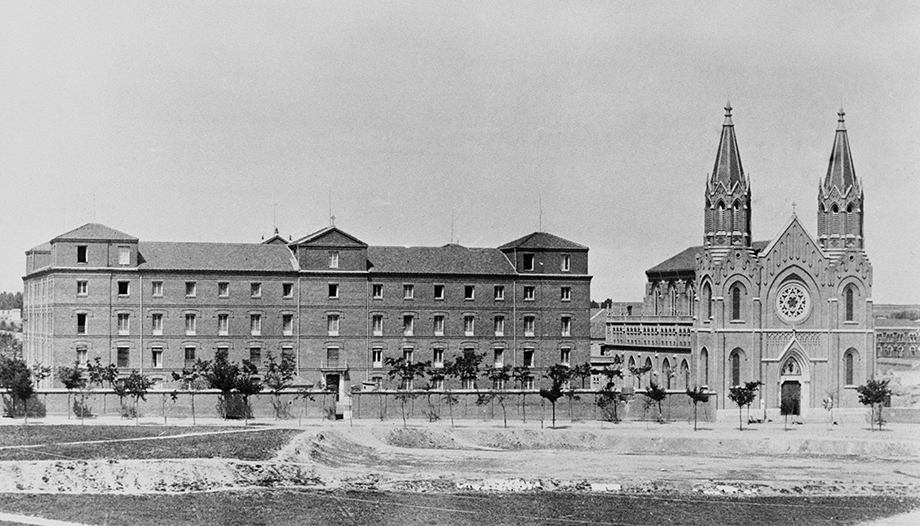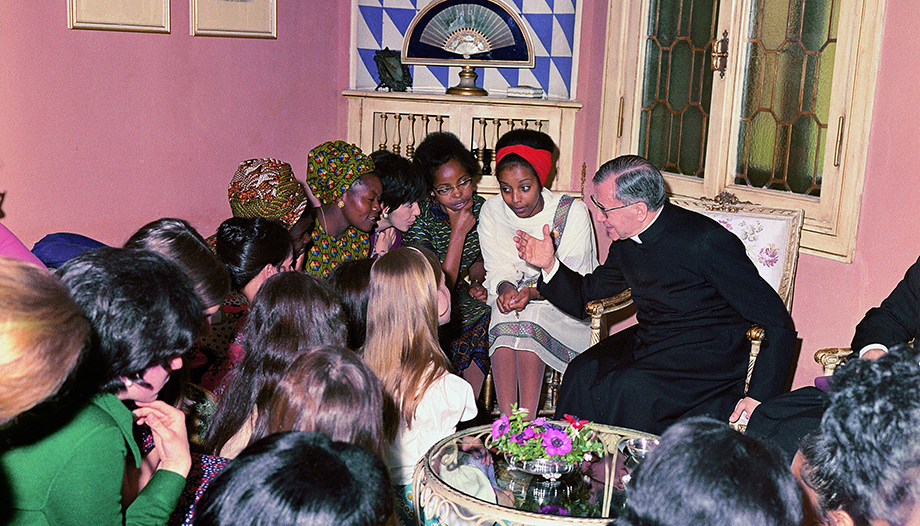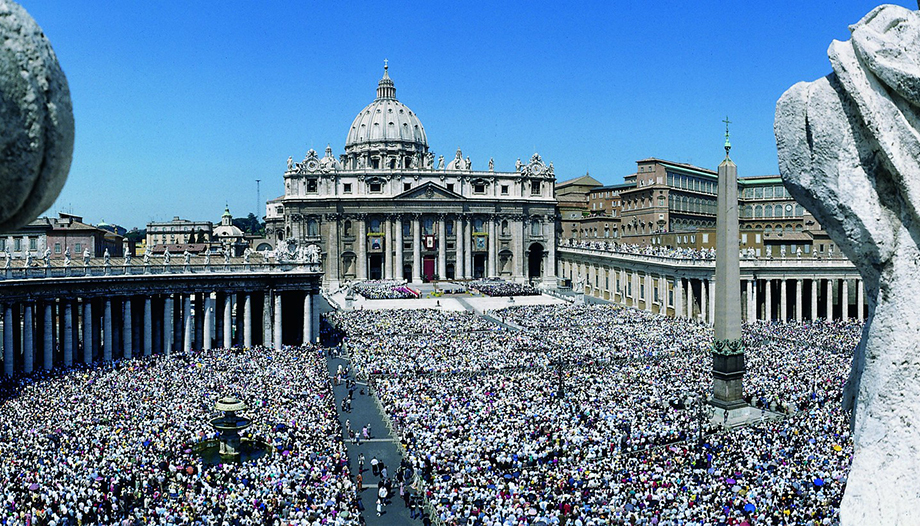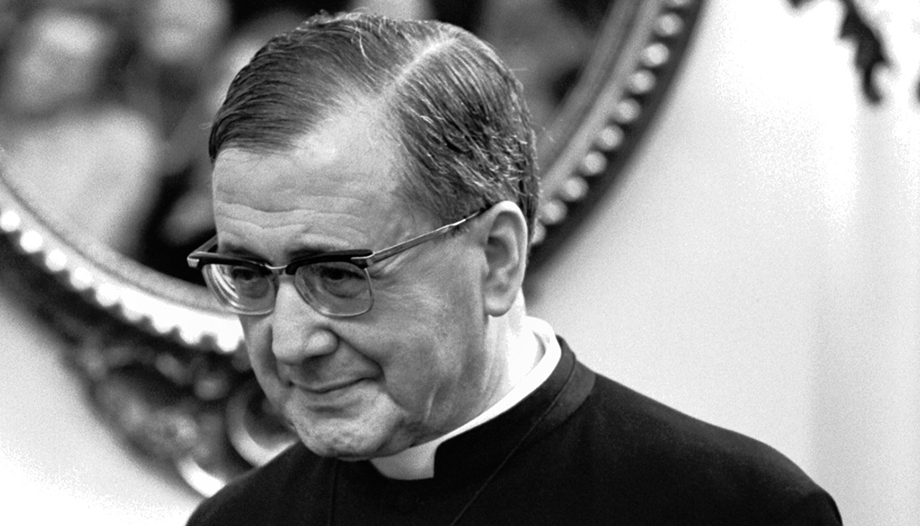The following article, which is markedly historical, is limited to the events of October 2, 1928. It does not, therefore, reflect the theological and juridical richness of that event, nor the breadth of the founding spirit of Opus Dei, which was completed on June 26, 1975, the date of St. Josemaría's death.
Arrival in Madrid
Coming from the diocese of Saragossa, José María Escrivá arrived in Madrid in April 1927 to complete his doctoral thesis in law. He was a young priest, twenty-five years old, who felt in his soul the uneasiness that God was asking something of him for the good of the Church, but he did not know what it was.
For a decade, he said, barruntaba a divine will. And, as it was veiled to him, he prayed for light.
The foundational light of Opus Dei
On September 30, 1928, Escrivá went to the convent of the Vincentians, located in the northern outskirts of Madrid at the time, to make a retreat with six other priests. On Tuesday, October 2, after celebrating Mass and attending a talk, he retired to his room and read some papers in which he had written down ideas and events that he considered inspirations from God.
While compiling "with some unity the loose notes, which until then I had been taking" (Intimate notes -from now on AI-No. 306), suddenly, he said, "Jesus wanted them to start to give concrete form to his work" (AINo. 331). Escrivá "realized of the beautiful and heavy burden that the Lord, in his inexplicable goodness, had placed on their backs" (AINo. 306). Later he would say that he had received a grace of a supernatural character, an "illumination". on the entire work" (AI306), a "clear general idea of my mission" (AINo. 179), which opened up an enormous apostolic panorama.
Excited because he had just seen "the Will of God" (AINo. 978b) for which he had prayed so much, he knelt down and gave thanks. Then, he heard the sound "of the bells of the parish of Our Lady of the Angels" (AI306), which called the faithful to Mass on the feast of the Custodians; later, he considered this event as a sign of the intercession of Holy Mary and the angels at the very moment of the foundation.

A spirit and an institution
So much for Escrivá's own account, the only witness to the events that took place at the original founding moment of the Opus Dei.
The founder did not explain or write down the content of what he saw -he will always use the verb see- that day. Everything points to the fact that he did not want to enclose in a single text a great supernatural light. In fact, there are practically no writings of his prior to March 1930, as if he wished to keep for himself what had happened since the foundation (October 2, 1928) until the moment he understood that there would be women in the Opus Dei (February 14, 1930). Therefore, the listener must believe José María Escrivá when he affirms that he has received a divine message.
Now, Escriva referred to the foundational light until the end of his days. His life, his preaching and his writings offer some clues as to what happened. In concrete terms, as is also the case with other charismatic institutions of the Church, we find two intertwined dimensions in this irradiation: a spirit and an institution.
A Christian message
On October 2, 1928, José María Escrivá felt he had received a divine message. He understood that he had received a grace, a divine force, a light from the Holy Spirit. In no way was it a concept forged after a process of intellectual reflection or a brilliant inspiration arising from the teachings of the Magisterium, the Fathers of the Church and spiritual authors, both classical and contemporary. It was a spirit that appeared universal, destined for any place, time and culture.
The heart of the charisma was rooted in the secularity as the way to be a saint: to be united to Jesus Christ and to make him known wherever one works and resides was the message. In his own words of years later, he was to "promote among people of all classes of society the desire for Christian perfection in the midst of the world", "participating in the most diverse human tasks" (ConversationsNo. 24 and 61).
The centrality of the laity
At that time, the Church presented holiness as something possible for all men, also in the secular sphere. But, in general, the desire to be a saint was considered a call to the religious state. Spiritual literature spoke of the degrees of holiness that could be attained on earth, which, at the highest level, was attained in the consecrated life.
Thus, the existence of a little less than one percent of the members of the Church - the consecrated - was presented as the best or most perfect way to go to God. It was enough to enter a Catholic temple to see so many statues of consecrated saints, a few of secular priests and none of lay people.
The spirit that Escrivá had received was directed to the secular who, in the Church, are the laity and secular priests, the majority of whom are diocesan. I was saying that this 99 percent of ordinary Christians are called by God to discover in human and temporal realities the path that leads to Christian fullness, to identification with Jesus Christ.

A family in the Church
In addition to the gift, the charisma was shown in the eyes of José María Escrivá as a mission and a task. God called him to proclaim holiness to all men, to explain that identification with Christ is possible in one's own state of life.
He considered that the transmission of this message would be done in and from a Christian community; in fact, he did not contemplate spreading it through a book or the means of communication of the time, such as the radio or the press. It would be done by people incorporated into a Christian family through a call from God -a specific divine vocation-, an individual discernment and the acceptance of those who would guide the institution.
Those who would be part of this spiritual family would personally live the charism - they would make it their own, they would make it their own. incarnateThey would then share it with the other members of the institution and, thirdly, they would spread it to the people they knew and to society as a whole.
Furthermore, on that founding day he thought that, although the message was for all the secular members of the Church, the members of the institution would be only men, lay people and diocesan priests.
Further development
After October 2, 1928, Escrivá searched for a Church institution that had the charism he had received, for he did not wish to be the founder of something new. After receiving information from various pious unions, tertiary orders and associations in Spain, the United States, France, Holland, Hungary, Italy and Poland, he came to the conclusion that none had a spirit equal to his own.
Months passed and on February 14, 1930, she understood that God was asking her that there should also be women in the institution and, at the same time, that he was calling her to begin a new path of holiness and apostolate in the Church.
José María Escrivá knew that the original foundational light was the nucleus of a teaching open to further development, something that was to span the arc of his life. For example, in 1931 he received two important foundational lights that underpinned the original one.

Work as a means of sanctification
On August 7, he gained a new understanding of the words of Jesus Christ: "When I am lifted up from the earth, I will draw all men to myself" (Jn 12:32): the Christian places Christ at the heart of the activities he carries out in the world. In this way, professional work appeared as the material that people have to sanctify and the instrument with which they sanctify themselves and others.
Then, on October 16, while riding in a streetcar, she suddenly felt "the action of the Lord, who made this tender invocation germinate in my heart and on my lips, with the force of something imperiously necessary: Abba! Pater(Letter 29, no. 60); since then, he has pointed out that the foundation of the spirit of Opus Dei is a deep sense of the divine filiation.
From the founding moment on, Escrivá vividly spread the message of union with Jesus Christ in the place that each of us occupies in society; the reality, unknown to many, that "these world crises are crises of saints", that God "is like a loving Father - he loves each one of us more than all the mothers in the world can love their children - helping us, inspiring us, blessing... and forgiving" (The Way301 and 267).
Historian








